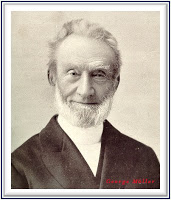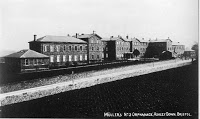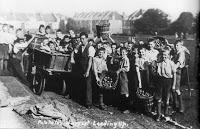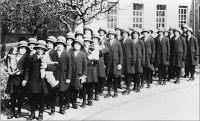Joseph Herrin (08-29-09)

George Muller
The name George Muller is familiar to many Christians who have heard of his work in providing for thousands of orphans in England during the 1800s. His was a remarkable life. He was born in Prussia in 1805, what would now be called Germany. The Prussian people were known for certain characteristics that some have attributed to the region’s success and influence.
Many people believe that some specific “Prussian virtues” were part of the reasons for the rise of their country, for instance: perfect organization, discipline, sacrifice, rule of law, obedience to authority, reliability, tolerance, honesty, frugality, punctuality, modesty, and diligence.
[Source: http://en.wikipedia.org/wiki/Prussia]
These traits describe George Muller’s life and ministry throughout his adult life, but they were far from him as a youth. He was not raised in a Christian home, though his father chose for him to pursue a career as a clergyman. This had nothing to do with any religious belief, or devotion. It was merely a career decision to provide a good living and security for his father in his old age.
Before he was ten years old George Muller was stealing money from his father. As he entered his teen years he was drinking regularly, reading novels, and living an immoral life. His dishonesty led to his being jailed at the age of 16 for a brief period, having run up bills at expensive hotels that he could not pay. His father paid off his bills and beat him severely upon his return home. He was then sent off to study for the university and to prepare for a job among the clergy.
As a student of divinity, George Muller continued a profligate lifestyle. He stole money from friends, and lied constantly to cover his tracks and to keep his father satisfied. In 1825 he attended a Bible Study with a friend from the university, and it was there that God began a work of grace in his heart. In his autobiography, George Muller describes this time.
Now my life became very different, though not so that all sins were given up at once. My wicked companions were given up; the going to taverns was entirely discontinued; the habitual practice of telling falsehoods was no longer indulged in; but still a few times after this I spoke an untruth. I read the Scriptures, prayed often, loved the brethren, went to church with the right motives, and stood on the side of Christ, though laughed at by my fellow students… About Easter, 1826, I saw a devoted young brother, named Hermann Ball, a learned man, and of wealthy parents, who, constrained by the love of Christ, preferred laboring in Poland among the Jews as a missionary to having a comfortable living near his relations. His example made a deep impression on me. The Lord smiled on me, and I was, for the first time in my life, able fully and unreservedly to give up myself to Him.
At this time, George Muller understood that his life was to be lived for the glory of God, and that he could not give himself to the pursuit of worldly position, material security and social success. He considered that God might have him also walk away from the familial ties to his well-to-do family and labor in some foreign land as a missionary. He was fully willing to give himself to such a course, and he felt he must declare this to his father. He writes:
My father was greatly displeased, and particularly reproached me, saying that he had expended so much money on my education, in hope that he might comfortably spend his last days with me in a parsonage, and that now he saw these prospects come to nothing. He was angry, and told me he would no longer consider me as his son. But the Lord gave me grace to remain steadfast. He then entreated me, and wept before me; yet even this by far harder trial the Lord enabled me to bear. After I had left my father, though I (needed) more money that at any previous period of my life, as I had to remain two more years at the university, I determined never to take any more from him; for it seemed to me wrong, so far as I remember, to suffer myself to be supported by him, when he had no prospect that I should become what he would wish me to be, namely, a clergyman with a good living. This resolution I was enabled to keep.
There comes a time in the life of all those who would be true disciples of Christ, when they must face the cost of following Him wherever He might lead them. The plans of the Lord are quite often not the plans that our parents, brothers and sisters, wife, or children would choose for us. For this reason, Christ exhorted all who would truly be His disciples to consider carefully the cost.
Luke 14:25-27
Now great multitudes were going along with Him; and He turned and said to them, “If anyone comes to Me, and does not hate his own father and mother and wife and children and brothers and sisters, yes, and even his own life (psuche – soul), he cannot be My disciple. Whoever does not carry his own cross and come after Me cannot be My disciple.”
I have found that most Christians make but small progress in a life of faith and in conformity to Christ until after they are brought to count the cost of surrendering all to Christ and accepting it. It is at this point that the Spirit begins to lead a person down paths that they would not have chosen for themselves, but which result in much spiritual growth. As one continues down in this life of surrender it will eventually lead to much fruitfulness.
There is very little fruit among Christians today, very little evidence of conformity to Christ, because there is such an absence of surrender. Christians today largely believe that being a disciple does not require the same radical commitment observed among the early saints of Scripture.
This surrender of our will to God very often results in hardship and trials and sorrow to those who take God’s will to be their own. Yet the very things we consider hardships and distresses are the experiences Yahweh uses to lead us forth into a life of faith and obedience that will one day bear much fruit. So it was with George Muller. His willingness to surrender the direction of his life to God brought immediate rejection from his earthly father. His previous means of support was cut-off, but this was exactly what was needed in order to begin to teach this son of God to begin looking to his heavenly Father for all things.
The Lord directed George Muller to look to him for his support while he was at the university. As he was cast over onto the provision of his heavenly Father for the first time, he writes:
Shortly after this had occurred, several American gentlemen, three of whom were professors in American colleges, came to Halle for literary purposes, and as they did not understand German, I was recommended by Dr. Tholuck to teach them. These gentlemen, some of whom were believers, paid so handsomely for the instruction I gave them, and for the lectures of certain professors which I wrote out for them, that I had enough and to spare. Thus did the Lord richly make up to me the little which I had relinquished for His sake. “O fear the Lord, ye His saints; for there is no (lack) to those who fear Him.”
From this small beginning of faith, George Muller was to grow in faith and reliance upon God until he was trusting Him for the provision of more than 2,000 orphans at a time, supporting over a hundred missionaries in part or in whole, and printing and distributing hundreds of thousands of Bibles and millions of tracts annually.
All of this was done without making any public pleas for funds. Mr. Muller had no television or radio program where he would make pleas for support. He had no advertising campaigns. He had no campaigns for capital projects. He did not work through worldly solicitations to have the needs of all of these heavy burdens met. Rather, he learned to take all his needs to God the Father. Having maintained a good conscience in only taking on those labors that he was assured the Spirit of Christ was directing him to, he was able to look to Christ to meet every need.
The year 1835 found Mr. Muller residing in England. He was ministering much through preaching at local churches. He had a few years earlier begun The Scriptural Knowledge Institute, which was a work aimed at the printing and distribution of Bibles and tracts, and the instruction of young people in a large number of Sunday schools which he supported. It was in this same year that he began to consider the work that was to bring him renown, even as it encouraged millions of Christians to place a much greater trust in God while encouraging them to come before Him confidently in prayer. This work was to be among the orphans of England. Mr. Muller described the reason for entering into this work in the following way.
I therefore judged myself bound to be the servant of the church of Christ on the particular point on which I had obtained mercy; namely, in being able to take God by His word, and to rely upon it.
For the previous ten years Mr. Muller had been looking to the Lord for all of his provision, and those of a growing ministry, and he had Found Yahweh faithful. Now he desired to stir up the body of Christ to walk in the same grace that he had received. He continues:
All of these exercises of my soul, which resulted from the fact that so many believers with whom I became acquainted were harassed and distressed in mind, or brought guilt on their consciences on account of not trusting in the Lord, were used by God to awaken in my heart the desire of setting before the church at large, and before the world, a proof that He has not changed in the least; and this seemed best done by the establishing of an orphan house. It needed to be something which could be seen, even by the naked eye. Now, if I, a poor man, simply by prayer and by faith, obtained, without asking any individual, the means for establishing and carrying on an orphan house, there would be something which, with the Lord’s blessing, might be instrumental in strengthening the faith of the children of God, besides being a testimony to the unconverted of the reality of the things of God. This then was the primary reason for establishing the orphan house. I certainly did from my heart desire to be used of God to benefit the bodies of poor children bereaved of both parents, and seek in other respects, with the help of God, to do them good for this life. I also particularly longed to be used of God in getting the dear orphans trained up in the fear of God; but still, the first and primary object of the work was, and still is, that God might be magnified by the fact that the orphans under my care are provided with all they need, only by prayer and faith, without any one being asked by me or my fellow-laborers, whereby it may be seen that God is FAITHFUL STILL, and HEARS PRAYER STILL.
I think it is very needful to declare here that this is not some work that George Muller arrived at through the counsel of his own soul. As stated in his own words, he believed that God had led him to consider this work by placing before him so many souls who were walking in guilt due to their failure to trust in God. Nor did George Muller enter into this work hastily. His memoirs reveal that he patiently waited before the Father in every decision made concerning his labors. I have been much impressed with his testimony in this regard, and have shared it with a number of people over the years. In 1880 he preached a sermon where he shared the following:
Had it been left to us to make promises concerning prayer, I do not know that you or I could have done any more than say, “Ask, and ye shall receive.” Yet, while the promise is so full, so deep, so broad, so precious in every way, we have here, as becomes us with other parts of the word of God, to compare Scripture with Scripture, because in other parts additions are made, or conditions are given, which, if we neglect, will hinder our getting the full benefit of prayer.
George Muller went on to detail a number of conditions that were attached to the simple “Ask, and ye shall receive.” First, our petitions must be according to the will of God as is revealed in I John 5:14.
I John 5:14
And this is the confidence which we have before Him, that, if we ask anything according to His will, He hears us.
Mr. Muller shared in his autobiographical work that he would discipline his soul until it entered into a state of rest whenever he was considering some work of God, or the expansion of some work. He said he would not trust himself to discern the voice and will of God until he was assured in his soul that he would be equally as content to hear God say “No” to a matter as he would be to hear God say “Yes.” At the very beginning of this work, on November 28, 1835, he wrote the following in his daily journal.
I have been, every day this week, very much in prayer concerning the orphan house, chiefly entreating the Lord to take away every thought concerning it out of my mind if the matter be not of Him; and have also repeatedly examined my heart concerning my motives in the matter. But I have been more and more confirmed that it is of God.
George Muller did begin the orphan house soon afterwards, and God kept the work small for the first ten years. During the period from 1835 until 1845 he had never built an orphan house. The houses needed to keep the children were rented quarters. As many as 100 orphans and their care-givers resided together in a few houses that were all close in proximity in Bristol, England.
The record of these ten years is most enlightening for those who desire to understand the ways of God. During this period of time there were daily struggles for provision. It seemed that God rarely ever gave Mr. Muller and his fellow laborers anything beyond that day’s provision. This led to great trials, and constant seasons of intense prayer that God might not fail them.
I have read these accounts a number of times, and the monotony of the struggle day after day is very evident in the journal entries of Mr. Muller. Yet, he was not dismayed. Indeed, he considered the daily struggle to be a very normal experience for all who would follow the Lord in obedience and faith. The countless trials also led to countless acts of divine deliverance. The timing of the Lord’s provision was always such that never once in all those years did the orphans ever miss a meal. Yet day after day the laborers faith was tried. Summing up the year 1838, Mr. Muller wrote:
Should it be supposed… by anyone in reading the details of our trials of faith during the year… that we have been disappointed in our expectations, or discouraged in the work, my answer is… such days were expected from the commencement… Our desire is not that we may be without trials of faith, but that the Lord graciously be pleased to support us in the trial.
As I have considered these matters, and being acquainted with the testimonies of many other saints both contemporary and from previous times, and having walked with the Lord down very similar paths, I have observed that it is very common for Yahweh to lead His people to trust Him for their daily bread.
When Yahweh led the Israelites through the wilderness, He said He would provide manna from heaven each day. He instructed the Israelites to only gather what they would eat that day, trusting that He would be faithful to provide for them again the next day. Those who were fearful and did not trust gathered more than one day’s supply, but it became rancid and bred worms.
When Christ taught His disciples how to pray, He uttered the words, “Give us this day, our daily bread.” All those who will follow God by faith will be led to experience this daily dependence upon God. I can testify that it can be a very uncomfortable place for a man to walk, especially when he has others looking to him for their provision. Yet, God is faithful, and He would have us to rest in the confidence of that fact. There is a place of peace that all may enter into concerning Yahweh’s faithfulness. He will keep us daily facing need, He will try us repeatedly over a prolonged period of time, until we learn the lesson of trust and resting in Him.
Once a year George Muller would publish an account of God’s faithfulness. He would include testimonies of the daily struggles they faced, the prayers that were uttered, and the specific answers that were received. In this way he was able to strengthen and encourage the faith of millions of Christians worldwide.
Beginning in 1845 Mr. Muller was led of the Spirit to build orphan houses, as the number being admitted was increasing and it was causing some discontent among the neighbors where they were living. Forty years after the start of the orphan ministry the Lord had provided the means for a number of large homes to be built that would eventually hold as many as 2,000 orphans. The needs continually increased as the work expanded, and God continued to meet every need.
Note: Click on pictures to see them in higher resolution.

Number 3 Orphan House on Ashley Down, Bristol England.

The boys who were old enough were given exercise by working in the gardens during the growing seasons.

A group of girls from the girl’s orphan house.
One of the reasons I am posting this series at this hour is to encourage the saints of God to trust in the faithfulness of Yahweh in coming days. I believe that great poverty will come upon many lands. Grocery stores will be emptied. Famine will cover many lands that have only known prosperity for generations. There will be many who will be displaced from their homes, and the Spirit even testifies that many saints will be led to flee.
People can only carry a meager amount of provisions with them, even as that nation of Israelites who fled from Egypt could only carry a few days worth of food. The time will come when all will need to begin looking to Yahweh for their daily bread.
Many of the years that George Muller was caring for orphans were difficult years economically in England. Despite this, God never let the orphans go hungry, or lack warmth in the winter, or fail to have a roof over their heads. If He provided for thousands of orphans because one man was inspired to trust in Him, what will Yahweh do for His people in days ahead? The Spirit bears witness that the coming days will be filled with tales of miraculous provision and deliverance. God’s people will do exploits, and those who have faith in Him will be recompensed for their belief.
Heart4God Website: http://www.heart4god.ws
Parables Blog: www.parablesblog.blogspot.com
Mailing Address:
Joseph Herrin
P.O. Box 804
Montezuma, GA 31063


0 Comments